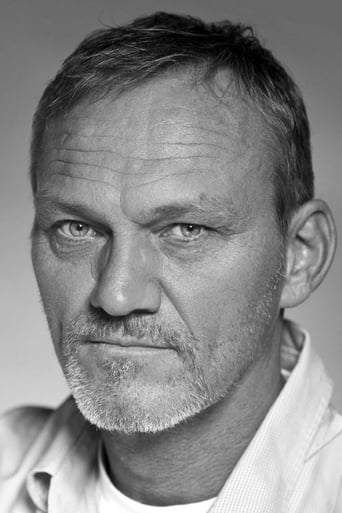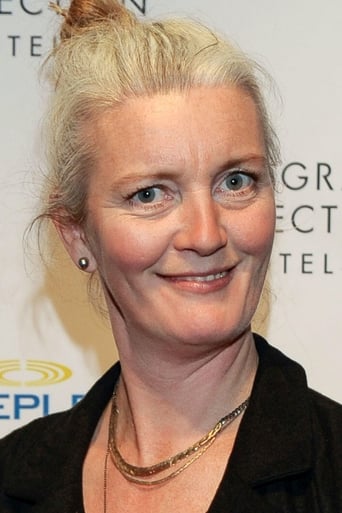Alicia
I love this movie so much
Matrixston
Wow! Such a good movie.
SanEat
A film with more than the usual spoiler issues. Talking about it in any detail feels akin to handing you a gift-wrapped present and saying, "I hope you like it -- It's a thriller about a diabolical secret experiment."
Tayyab Torres
Strong acting helps the film overcome an uncertain premise and create characters that hold our attention absolutely.
wladislawdraculesti
It may seem that this film is about music or about a musical style, but it really speaks about what is that people thinks about us and what they think we should be or they want us to be, about what we want to be and about who we really are. Talk about the most important thing in life, which is one's own identity and our happiness. Very powerful message. It is an excellent film.
Vikingbyheart
Films about family dramas are already common in the movie theater, but the choice of the Icelandic writer-director Ragnar Bragason (known for Bjarnfreðarson - 2009) to put the heavy metal in the foreground was an innovation, so Málmhaus (original title) or Metalhead (English title) stands out compared to other similar narratives. The story shows how the loss of a child in a tragic accident can affect the life of a family and also of a whole small community in rural Iceland. The protagonist of the plot is Hera, played by Þorbjörg Helga Þorgilsdóttir (known for Djúpið - The Deep - 2012), who witnessed the death of her older brother by a tractor when she was only 12 year old, in 1983. Traumatized, disillusioned with life and with her faith completely shaken, she decides to seek comfort in the heavy metal musical style that her brother loved so much.After this initial introduction, Bragason transports us to the early 90s, addressing the main character already in adulthood. With gloomy and melancholy appearance, always wearing a leather jacket and black clothes, Hera is now quite adept of the black metal way of life. She isolated herself from the outside world and is disconnected from the small community in which she lives. Her only moments of balance seem to be next to her guitar, with which she risks to compose her own musics, or when she listens to her cassette tapes or reads magazines in her room.The presence of Hera is disruptive to her parents. Unable to break free emotionally and psychologically from the memories of the tragedy, she lives committing petty crimes in self-destructive acts and causing confusion in the neighborhood. Her dressing style and her personality are also a painful form of her parents remember their dead child. This is reflected in the depression of her mother, Droplaug, played by Halldora Geirharðsdóttir (known for Englar alheimsins - Angels of the Universe - 2000 and Hross í oss - Of Horses and Men - 2013), and in the hidden suffering of her father, Karl, interpreted by Ingvar Eggert Sigurðsson (he acted in Englar alheimsins - Angels of the Universe - 2000, Myrin - Jar City - 2006, Hross í oss - Of Horses and Men - 2013 and Everest - 2015). Thus, each one experiences the grief and the pain in their own way, but it is clear that that accident compromised the family's harmony.With a peculiar intimate view of heavy metal and black metal movements, Bragason does in Metalhead a production with quite personal characteristics, printing throughout the script references carefully cited and associated with the soundtrack. It is through music that the director expresses and exposes the psychological and emotional state of the protagonist, from her feelings to her internal conflicts. Fans of the genre, besides the recognition of the songs, will delight in with Victim of Changes (Judas Priest), Heartless World (Teaze), Run For Your Life (Riot), Strange Wings (Savatage), Me Against the World (Lizzy Borden), Am I Evil? (Diamond Head), Symphony of Destruction (Megadeth), Í Helli Loka (Sólstafir) and Svarthamar (Pétur Ben & Þorbjörg Helga Þorgilsdóttir - Málmhaus).The symbolism is present throughout the film. The clothes, the music, the melancholy or obscurity, the corpse paint (face paint in black and white), death, religion, in scenarios such as the church or the cemetery, in the bitter cold of winter, and even in Norwegian characters, a reference to Øystein Aarseth (Euronymous) and Per Yngve Ohlin (Dead), founding members of the Norwegian black metal band Mayhem, land that created the subculture of the Norwegian black metal. Some documentaries address and depict this time, as Den Svarte Alvor - The Black Seriousness (1994), Satan Rir Media - Satan Rides the Media (1998), Once Upon a Time in Norway (2007) and Until the Light Takes Us (2008).Clinging to period details is another strong point of the film, giving it a certain nostalgia of the 80s and 90s. We have the record player and vinyl records, cassette tapes and walkman, household appliances, such as microwaves, cathode ray tube TV and VHS video tapes and cars, all faithfully depicting the period in question. The beautiful shots of Iceland and the moments of black humor soften the delicate issue addressed in the narrative, contrasting with the inner desolation of the protagonist. The performance of Þorbjörg Helga Þorgilsdóttir is one of the highlights of the movie, giving veracity to the story of the main character.Metalhead is a film that is based on a universal theme, music, employing it to show how people deal with pain, loss and suffering. The story shows the search for an identity and for oneself, an attempt to find meaning for life that goes beyond music.Originally posted in: https://vikingbyheart.blogspot.com.br
Alucard Venom
I wasn't sure what to expect from this movie. Title was either "hit or miss" and I was afraid it was going to be exploitation movie. But it's not.It was a great drama about how certain people deal with their pain, how people around them react to their, let's say unusual way of expressing their pain.Story fallows a young girl Hera who witnesses death (by accident) of her older brother. Few years after that, she still can't cope with pain of losing her brother, so she turns to metal music as a way of escapism. Naturally, living in small community, she is often misunderstood by others. She expresses her pain on her own "unique" way, while her parents express theirs on their own (father feeling accident was his fault, while mother has trouble moving on).Hera eventually goes on a self-destructive path because it's the only way she can deal with her loss and anger since no one can really understand how she feels. Good example of that scene is her best childhood friend who mistakes drunken sex for love, proposing to her, while she replies "Can't you see anything?"This is a movie about human nature, nature of pain, how certain people deal (or can't deal) with pain and loss of a loved one and how people sometimes judge people by it's cover.Guy who wrote a review here telling this movie is about "Jesus helping metalheads" just because it happens that movie has understandable priest (because you know, that can't happen in real life) clearly missed the point of the movie.This was never a movie about "Jesus helps metalhead". It was a movie about human nature. Hera never stopped being metalhead, it was just a hint that she and her parents are moving on eventually, because they, like rest of the community are starting to understand Hera.
mistercsays1
Without a doubt, Metalhead is the best film about a heavy metal-loving Icelandic farm girl that I have ever seen. Given the lack of access to Scandinavian films for Australian cinema audiences, films such as Metalhead remind us that film is a universal medium and that interesting screen stories can emerge from anywhere. Set in rural Iceland, Metalhead is a film that explores love, grief, family, identity, community and the healing power of music; heavy metal in particular. Director Ragnar Bragason has successfully melded humour into a story that is ostensibly about the lingering after effects on a family following the tragic passing of one of their own. The film opens with the death of teenager Baldur in an accident that is witnessed by his 12-year-old sister Hera. In the aftermath of Baldur's death, Hera finds solace in the music her brother loved so much, immersing herself in his world of heavy metal. Years later, the young adult Hera is an obsessive, posters adorning every inch of wall space in her room, Judas Priest and Dio blasting from her tape deck and a wardrobe that is exclusively black.Haunted - both literally and figuratively - by the death of Baldur, Hera struggles to get her life in order. She is seemingly desperate to move away from the stifling confines of her family home, but is unable to actually do so whenever the opportunity arises. Hera is stuck in neutral, unable to move forward and forge her own path, unwilling to sever ties with the connection to Baldur that is the farm they grew up on. The recurring theme throughout the narrative is Hera's failed efforts to break free – either emotionally or geographically – from her memories of the tragedy. She acts out against her parents and the community as she struggles to find any meaning to her life beyond her music. In her early 20's, Hera is seemingly on a road to nowhere despite the best efforts and patience of her family and others, including new-priest-in-town Janus (Sveinn Olafur Gunnarson) and her childhood best friend Knutur (Hannes Oli Agustsson). This is not to say we can't sympathise with her though and it is great credit to the performance of Thora Bjorg Helga that she instils likability in Hera that belies her behaviours.Of course, Hera is so absorbed by her own grief that she fails to see the impact Baldur's death has had on her parents, Karl (Ingvar Eggert Sigurdson) and Droplaug (Halldora Geirhardsdottir), who are suffering in silence, more successful at putting on a polite facade, despite being trapped in their own isolation. Karl is stoic on the surface, keeping his suffering buried deep within, focused on his responsibilities to the family dairy operation. Droplaug meanwhile, continues to struggle in her grief and, despite the passing of 10 years, simply cannot let go of her son, refusing to make any changes to his bedroom that serves as a shrine of sorts; she is often lost in her memories and oblivious to what is happening in her immediate vicinity. It is only when both Karl and Elsa are able to re-connect with each other that they are able to move forward from the pain that has haunted them for too long.Despite the serious nature of the themes explored in the film, there are many moments of great humour, most of which revolve around the reaction of people (and animals as well for that matter) to Hera's extreme music and/or appearance. A trio of characters who appear towards the end of the film are hilarious and Bragason never opts for the predictable. Just when you think you know where the story is going and how it might all end, Hera finds herself on another path that may, or may not, enable her to find some kind of contentment. Janus and Knutur are great characters who perhaps show Hera more compassion than she deserves given the way she treats them both.The film provides considerable insight for the uninitiated into the difficulties endured by those living in an environment in which the weather is a constant nemesis. Despite the aggressive nature of the music from which it gets its title, Metalhead is ultimately a temperate family drama set against the most striking of backdrops. The rugged, isolated landscape and the harsh climactic conditions of rural Iceland serve as a fitting locale for a film that threatens to topple into the darkness, but never does.




